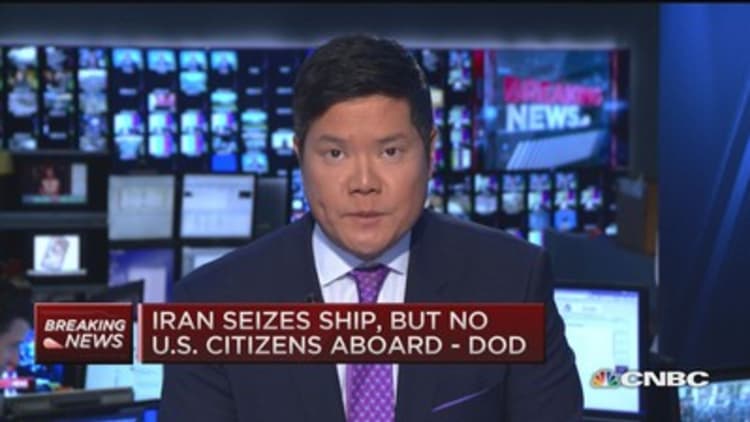Iran's abrupt seizure of a commercial vessel in the Persian Gulf raises the big question of who exactly ordered the capture of the Maersk Tigris—and why.
Iranian forces seized the Marshall Islands-flagged ship on Tuesday, the Pentagon said, as the vessel was traveling through the Strait of Hormuz. There were no American crew members involved, but U.S. markets briefly fluctuated on a report from Al Arabiya, the Saudi-owned news network, which said that the ship was American.

Iran's semi-official Fars News Agency reported the vessel was seized by court order at the request of the country's ports authority, following a commercial dispute. Less clear, however, was the nature of the dispute, the parties involved or their motivations.
All this comes against the backdrop of ongoing negotiations between Iran and a group of world powers about the Islamic state's nuclear program. U.S. Secretary of State John Kerry on Monday told an audience at the United Nations that the United States and other major powers are "in fact, closer than ever to the good, comprehensive deal" that would lift crippling economic sanctions against Iran in exchange for close, international oversight of its push to advance its nuclear know-how.
Read MoreStocks rise, oil sells off as Iran vessel incident cools
Critical to assessing Tuesday's seizure is determining who in Iran carried it out, said Alireza Nader, senior policy analyst at Rand Corp. It's possible, he added, that the orders did not come from central leadership in Tehran. (Tweet This)
A deal to create detente with the West has caused a massive rift within Iran itself, with hard-line groups fearing what a more socially open and economically liberal Islamic state would look like. The seizure could indicate that reactionary elements within Iran's ruling apparatus—especially a wing of its military called the Revolutionary Guard—are trying to disrupt ongoing talks.
"So far, the Revolutionary Guard has supported the negotiations, but they're afraid of what could come after," he said, adding that the Guard has a history of "taking action more independently."
It probably was the Revolutionary Guard. Iran has two navies—one is the Revolutionary Guard navy, which is much less professional, much more provocative, and much more likely to cause this type of problem.Ilan Goldenbergsenior fellow, Center for New American Security
President Hassan Rouhani has faced strong opposition to his push for rapprochement with the West from more ideological elements within his own country. Any deal with the outside world—especially, the economic benefits it would likely bring—would strengthen Rouhani's political hand.
A deal also would likely hurt the hard-liners financially, experts said. The Western embargo in effect boosts some groups including the Revolutionary Guard, by protecting monopolies they hold over parts of the domestic economy from international competition. President Rouhani has stated outright that he wants to see further privatization within the Iranian economy.
"The [Revolutionary] Guard actually has a major stake in all aspects of the Iranian economy," including "a monopoly over certain economic sectors," Nader said. They're also involved in "illicit activities such as smuggling."
Writing in policy publication World Politics Review this month, Rouzbeh Parsi, a senior lecturer at Lund University who specializes on Iran, pointed out that the forces arrayed against Rouhani have varied motivations.
"Some oppose an agreement, which by definition will require an accord with the United States, on ideological grounds," he wrote. "Others, especially parts of the IRGC (Revolutionary Guard), which have benefited financially from the skewed economic environment created by the sanctions regime, will see their profit margins threatened by an opening of the Iranian market."
Read MoreIran negotiations are bearish for oil prices
That the seizure of the vessel took place within the Strait of Hormuz indicates it was likely the Revolutionary Guard, since the group operates there with its own fleet of smaller vessels, independent of the Iranian navy, said Ilan Goldenberg, senior fellow at the Center for New American Security, a bipartisan policy think tank based in Washington.
"It probably was the Revolutionary Guard. Iran has two navies—one is the Revolutionary Guard navy, which is much less professional, much more provocative, and much more likely to cause this type of problem."
Consider: In 2007, the Revolutionary Guard seized two boats carrying 15 British sailors and marines in the waters of the Shatt al-Arab waterway, just north of the Persian Gulf. Britain said the group was on a U.N.-approved mission, while Iran accused the British of trespassing on its waters. After nearly two weeks, Iran released the hostages, with Rouhani's predecessor, President Mahmoud Ahmadinejad, calling it a "gift" to the British people.
Another possible motivation: Yemen
Goldenberg also raised the possibility that the strike came not because the Guard wants to disrupt nuclear talks, but because it wants to flex muscle in order to save face after events last week in Yemen. Iran, which supports rebels in Yemen, backed down from sending a flotilla there after the U.S. brought its own Navy into the area.
"The United States moved ships over off the coast of Aden, and very publicly stated that Iran had to stop its supply of weapons to Yemen," Goldenberg said. "In response, the Iranians turned their ships around."
A spokesperson from Maersk told NBC News' Alexander Smith that the Maersk Tigris is currently being run on what they called a "time charter" by Rickmers Ship Management, which lists its head offices as Hamburg and Singapore on its website.


